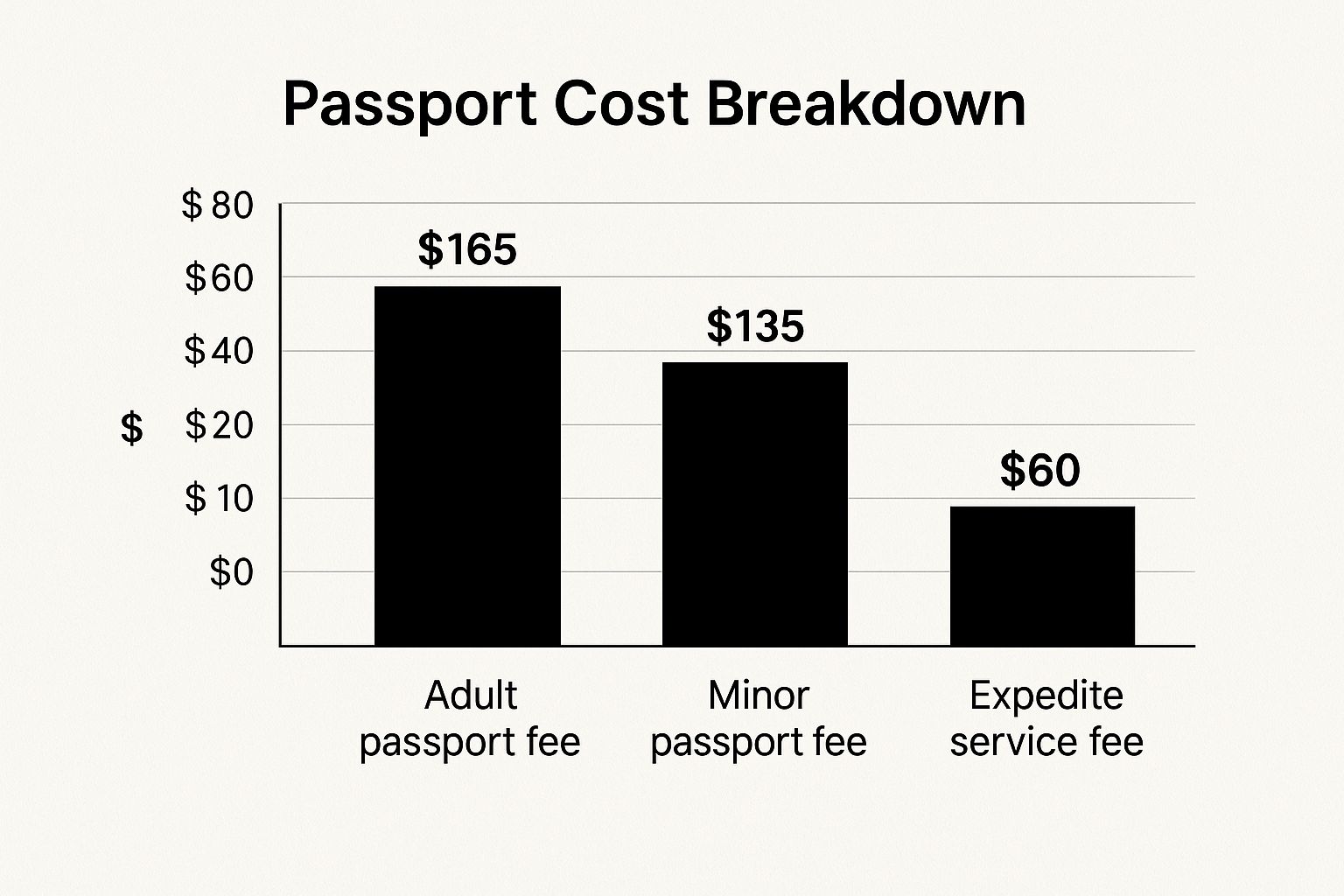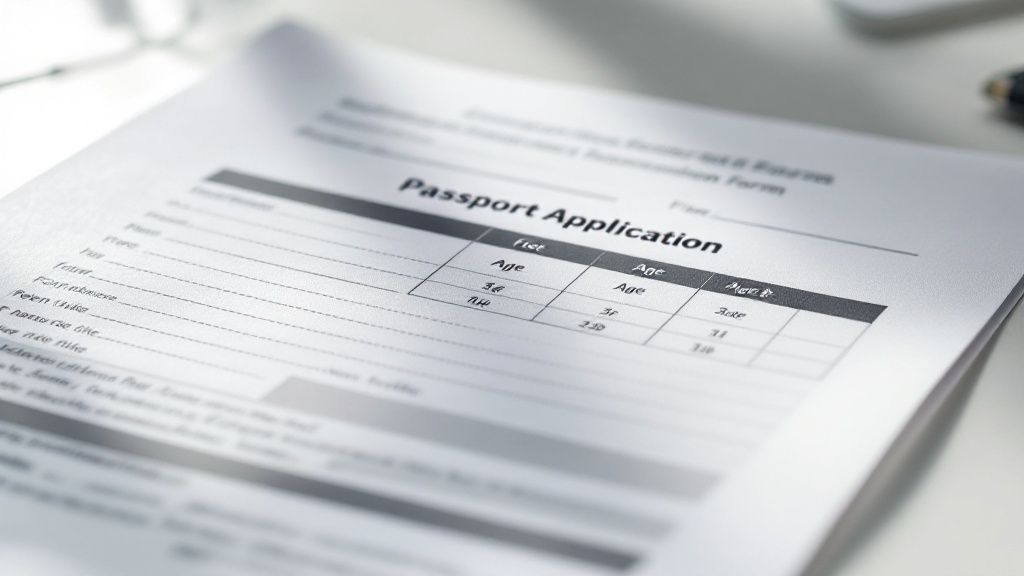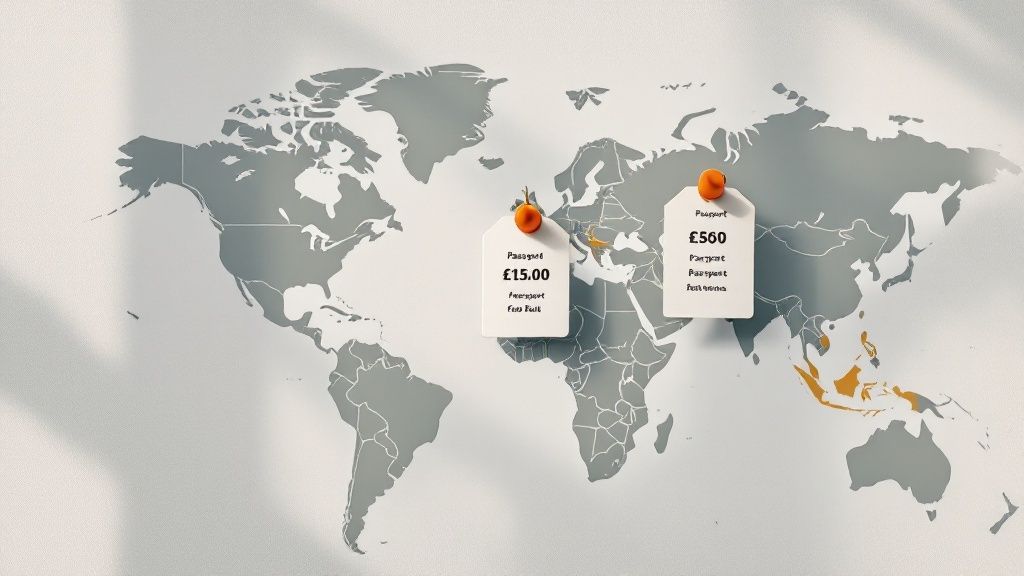So, you're getting a U.S. passport. Let's talk about the cost. For a first-time adult passport book, you're looking at a total of $165. This isn't a single charge—it's actually two separate payments: a $130 application fee that goes to the U.S. Department of State, and a $35 execution fee paid directly to the acceptance facility (like a post office) where you apply.
Breaking Down the U.S. Passport Fees
Trying to figure out exactly what you'll pay for a passport can feel a bit confusing at first, but it boils down to a few key factors. The final cost depends on your age, whether you're getting a full passport book or just a card, and if this is your very first passport or a renewal.
For instance, a new adult applicant has to pay both the application and execution fees. But if you're an adult eligible to renew your passport by mail, you get a break—the $35 execution fee is waived. That brings your cost down to just the $130 application fee.
This handy visual gives you a quick snapshot of the main costs involved.

As you can see, the base fee for an adult passport book is the highest, while options like a passport card are cheaper. If you're in a hurry, the optional expedite service adds a significant flat fee to your total.
To make it even clearer, here’s a table summarizing the basic costs you can expect.
Summary of U.S. Passport Application Fees
This table breaks down the standard fees for different types of applicants applying for a new passport book. Remember, renewal costs are often lower since the execution fee is waived.
| Applicant Type | Application Fee (to Dept. of State) | Execution Fee (to Acceptance Facility) | Total Cost |
|---|---|---|---|
| Adult (First-Time) | $130 | $35 | $165 |
| Child (Under 16) | $100 | $35 | $135 |
These are the foundational costs you need to plan for. Optional services like expedited processing or overnight delivery will add to these totals.
Keep in mind: Getting your passport is just the first step in your international travel journey. Depending on your destination, you might also need a visa. For travelers coming to the United States, our detailed guide on U.S. visa appointment booking can be a huge help in navigating that next phase.
Decoding the Fees for a New Adult Passport

If you're applying for your first U.S. passport as an adult, you'll notice the total cost is broken into two separate payments. This catches a lot of people by surprise, but it makes perfect sense once you know what each fee is for.
The biggest chunk of the cost is the application fee, which is $130. This payment goes straight to the U.S. Department of State. It covers the production of your high-tech passport book—think of all the security features packed into it—and the legwork of verifying your identity and citizenship.
The Mandatory Execution Fee Explained
On top of the application fee, every first-time applicant also has to pay a $35 execution fee. This isn't paid to the federal government. Instead, you pay it directly to the passport acceptance facility you visit, like a designated post office or a county clerk’s office.
This fee is non-negotiable and covers the critical services the facility provides. They're acting as a secure local checkpoint for the Department of State. Their job includes:
- Verifying your identity against your driver's license or other government-issued ID.
- Witnessing your signature on the application form, which is a key anti-fraud measure.
- Sealing your completed application and supporting documents into a secure package for processing.
Because these steps have to be done in person to ensure security, this $35 fee is a standard part of getting your first passport.
Why Two Separate Payments? The system is designed this way to keep the money straight. The Department of State gets its fee for making the actual passport, and the local facility gets paid for handling the in-person verification. Just be sure to bring two different forms of payment, as one check goes to the "U.S. Department of State" and the other goes to the facility itself.
This two-payment structure ensures the entire process, from your local post office to the federal printing facility, runs smoothly and securely.
How Renewal and Child Passport Costs Differ
When it comes to U.S. passports, there's no one-size-fits-all price tag. The cost really depends on who you are and whether you're getting a brand-new book or just renewing an old one. Let's break down two of the most common situations: renewing an adult passport versus getting one for a child for the first time.
If you're an adult renewing your passport, you're in luck—it's the most affordable route. You'll only pay the $130 application fee. The separate $35 execution fee is waived because most renewals can be handled conveniently through the mail, saving you a trip to a passport acceptance facility.
This mail-in option is a real time-saver. As long as your old passport isn't damaged, was issued in the last 15 years (and you were at least 16 at the time), and has your current name, you can skip the in-person appointment.
Understanding Passport Costs for Minors
Getting a passport for a child under 16 works a little differently. While the application fee is lower at $100, you can't escape the $35 execution fee. That’s because you have to apply in person with your child, and typically both parents or legal guardians must be present.
This puts the total upfront cost for a child's passport at $135. But there's another important detail to consider that impacts the cost over time.
Key Difference in Validity: An adult passport is good for a full ten years, but a child's passport is only valid for five years. This is an intentional security measure, since a child's appearance changes so much as they grow.
What does this mean for your wallet? It means you'll be going through the application process twice as often for your child. Over a decade, you’ll spend $270 ($135 x 2) to keep their passport current, while a first-time adult passport covering that same ten-year period costs $165. For families who love to travel, it’s smart to budget for this recurring expense.
The True Price of Expedited Passport Services
If the standard passport processing time just won't cut it for your travel plans, you can pay to jump the line. But how much does a passport really cost when you're in a hurry?
The most common way to speed things up is by paying the government’s official expedite fee. This is a flat rate you add right on top of your normal application and execution fees. It’s designed to slash the processing time, often shaving several weeks off your wait.
But that’s not the whole story. The final bill for a rushed passport often includes a few other costs that are easy to miss but can definitely add up.
Beyond the Basic Expedite Fee
For starters, you can pay extra for 1-2 day delivery to get your application packet to the processing center faster. You can also pay another fee to have your shiny new passport book shipped back to you via express mail once it's ready.
While technically optional, most people on a tight deadline find these shipping upgrades are non-negotiable.
Here’s what you’re really looking at:
- Government Expedite Fee: The fixed cost you pay the U.S. Department of State to process your application faster.
- 1-2 Day Delivery to Processing Center: An optional fee to get your application in their hands almost immediately.
- 1-2 Day Return Delivery: Another optional fee to get the finished passport back to you as quickly as possible.
These extras can really inflate the total price. It’s a classic trade-off between time and money, so knowing all the potential costs is key to budgeting accurately.
Let's break down how these costs stack up in a real-world scenario.
Comparing Standard vs. Expedited Passport Processing Costs
| Service Type | Government Fee | Optional 1-2 Day Delivery (Approx.) | Estimated Total Cost Range |
|---|---|---|---|
| Standard Service | $165.00 | N/A | $165.00 |
| Expedited Service | $225.00 ($165 + $60) | $19.53 (Return Only) | $244.53 |
| Expedited + Full Express Shipping | $225.00 | ~$40.00 (To & From) | ~$265.00+ |
As you can see, opting for the full expedited experience with priority shipping both ways can add nearly $100 to your total.
For true travel emergencies, some people use third-party passport courier services. These private companies can charge hundreds of dollars on top of all government fees to hand-carry your application to a regional passport agency. This is a last-resort option, usually reserved for documented life-or-death situations where the high cost is worth the incredible speed.
Speeding up a passport is one thing, but navigating international travel often means dealing with visa timelines, too. If you have friends or family coming to the U.S., you can learn more about how to expedite a U.S. visa appointment in our guide.
Putting U.S. Passport Costs in a Global Context
Ever wonder how the cost of a U.S. passport stacks up against what people pay in other countries? It can sometimes feel like a steep price, but a quick trip around the world shows a pretty wide spectrum.
For a first-time adult applicant, the U.S. passport book comes in at $165. This fee covers everything from the high-tech security features embedded in the document to the administrative work that goes into verifying your identity and issuing the book. It’s a middle-of-the-road price, globally speaking.

When you start looking at global prices, you’ll see some significant differences. A handful of countries charge quite a bit more, while others are surprisingly less expensive.
For instance, a Turkish passport currently holds the title for one of the most expensive, running about $309 USD. Down under, Australians pay around 412 AUD (roughly $267 USD), and Liechtenstein isn't far behind at $264 USD. You can dig deeper into these numbers and more over at Passport-Collector's global fees list.
A Quick Global Price Check
Here’s a snapshot to see where the U.S. stands among some of the pricier options for a standard 10-year passport:
| Country | Approximate 10-Year Fee (USD) |
|---|---|
| Turkey | $309 |
| Australia | $267 |
| Liechtenstein | $264 |
| United States | $165 |
So, what's behind these huge price gaps? It really comes down to a mix of national economics, the level of security technology used in the passport, and the administrative infrastructure each country has in place.
The Big Picture: No matter the price tag, a passport is an investment in years of global mobility and personal security.
Seeing where the U.S. fee lands really puts things in perspective. It's not the cheapest, but it’s far from the most expensive, offering a solid balance of cost and value.
With that global view in mind, let's talk about how you can keep your own passport costs as low as possible.
Smart Ways to Save on Your Passport
A little planning goes a long way. Here are two of the easiest ways to manage your spending:
- Renew by mail whenever you can. If you're eligible, this is a no-brainer. It lets you skip the $35 execution fee you have to pay in person.
- Give yourself plenty of time. Expedited processing adds a hefty surcharge. Avoid it by starting the application or renewal process well before you need to travel.
Ultimately, this comparison highlights that the U.S. passport provides excellent value for the access and security it delivers, especially when measured against its international counterparts.
Frequently Asked Questions About Passport Costs
Even after breaking down all the numbers, it's natural to have a few lingering questions about passport fees. Let's tackle some of the most common ones so you know exactly what to expect.
What Payment Methods Are Accepted?
This is a great question, and the answer depends on which fee you're paying. The main application fee sent to the U.S. Department of State has strict rules: you have to pay with a personal check or a money order.
The separate $35 execution fee, which you pay on-site at the acceptance facility (like a post office), is a different story. These locations are usually much more flexible and often take credit cards, debit cards, or cash. Your best bet is to give them a quick call before you head over to confirm what they accept.
Can Passport Fees Ever Be Waived?
For the vast majority of people, the answer is no. The government doesn't offer fee waivers for standard tourist or business travel.
Waivers are reserved for incredibly specific and serious situations, like a documented life-or-death emergency that requires immediate international travel. If you find yourself in that unfortunate circumstance, you'll need to provide official proof (like a death certificate or a doctor's letter) when applying at a regional passport agency.
Does It Cost Extra to Correct a Passport Error?
It all comes down to who made the mistake. If the error is on the government's end—for instance, they misspelled your name on the printed passport—they will fix it for free. You just need to submit Form DS-5504 within one year of the passport's issue date.
However, if you made the mistake on your application form, or if your information has legally changed (like a new last name after marriage), you’ll have to go through the application process again and pay the fees.
Pro Tip: Double- and triple-check your application before you mail it in. A few extra minutes of proofreading can save you the headache and expense of paying for a whole new passport.
Of course, getting your passport is often just the first step. If you're helping someone plan a trip to the United States, our B-2 visa documents checklist is a fantastic resource for understanding the tourist visa requirements.
Planning a trip to the U.S. for business or tourism? Don't let long visa appointment wait times derail your plans. At the moment, Vast Fisa supports only B1 and/or B2 visa applicants in select markets, including Canada, Colombia, Costa Rica, the Dominican Republic, Ecuador, Guatemala, Honduras, Mexico, Peru, Uganda, and Zambia. Let us monitor the schedule 24/7 so you can focus on your trip. See how it works at https://www.vastfisa.com.
